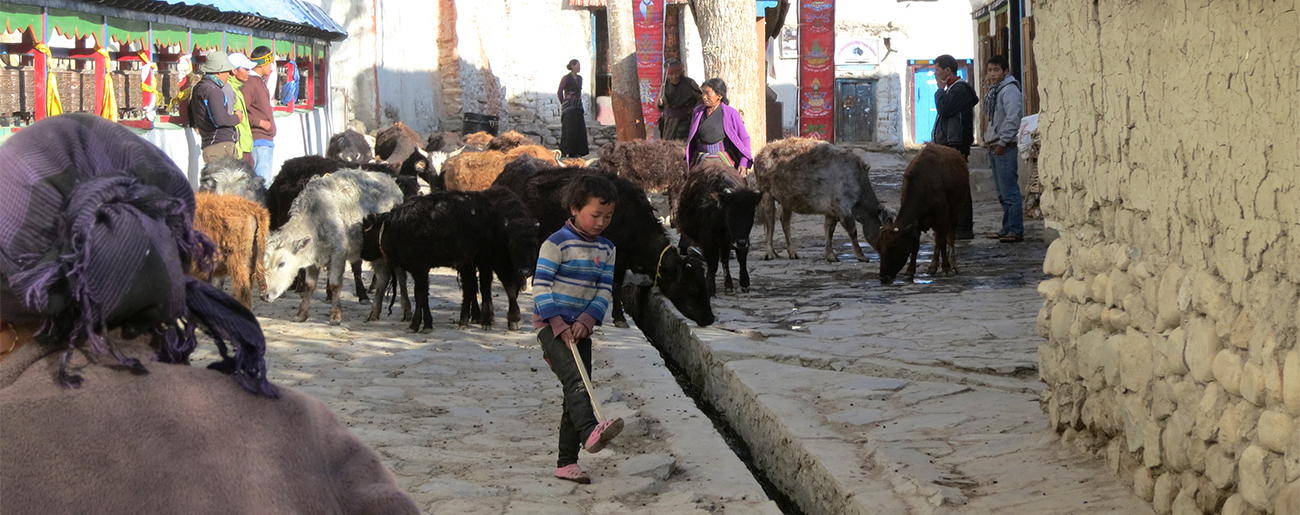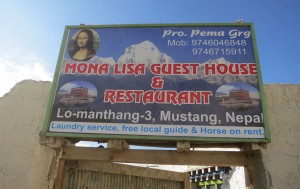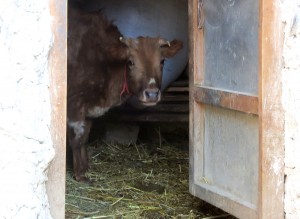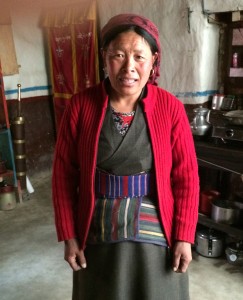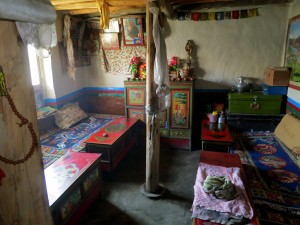Our arrival in Lo Manthang, after the long and grueling trip in the Manhindra Jeep, was accompanied with considerable anxiety. You see, shortly before we were to leave Sydney, I had received an email from the organiser of our trip into the Himalayas saying that there was no accommodation other than tents. (This despite the fact that he’d had months to organise.)
Now, my stance on tents is that I will stay in them – provided there is a war on. I was pretty certain that Raj and Charlie shared my view and while we were all prepared to rough it, tents were an absolute last resort.
Finding no solution with our organiser, we determined to solve the problem on arrival (it was that or cancel the trip!). And, on arrival in the late afternoon with the cold of the Himalayas descending upon us, we three jumped from an almost moving jeep, left Hem to unpack and set up tents (in case our efforts were in vain) and started our visits to each small inn along the street. We used our best diplomacy: our bashful smiles of contrition when we were told gently that arriving the day before the largest festival in the year we had no hope; our warm entreaties that even with our obvious stupidity a solution could and should be found; our personal open handed supplication to any reasonable suggestion and this soon resulted in two rooms for the three of us at the Mona Lisa Guest House – but only for one night.
We left Hem to fend for himself. Cruel you might think but having already paid his employer for non-existent accommodation and perhaps still needing the tents for our subsequent nights, we needed Hem to have some incentive to make our fall back position as comfortable as possible (and in any horse race “always back self interest”)
That night was bitterly cold, but, with our bellies full of Dahl Bhutt in our new sleeping bags and fortified by the Johnny Walker Black Label we had brought along, we jaw-boned our way into the night and slept well inside the protection of the rammed earth walls and roof of our accommodation.
The following morning, as my companions slept on, I walked through the town in beautiful warm sunshine.
The weather in Lo Manthang proved to be very reliable – at least predictable.
The sun rose warm and glowing at around seven or seven thirty (I don’t own a watch so am never quite sure of the time – except when I have appointments for which (unlike watch owners) I am never late). The air was still and the sun gave a gentle warm glow to everything it touched. From sunrise to around nine am was the best part of the day.
Inside the old town, the animals which lived on the lower floors of the Lopa houses, (mostly small cows) were released and driven through the narrow cobbled streets, through the main gate and into the fields. Behind them, they left a carpet of dung which was quickly scraped up and piled in sunny corners to become the fuel that fired the cooking stoves in each Lopa kitchen.
On my return to our lodgings, I found that Raj had worked his magic and our host (the owner of the hotel) announced that he may have found us a home stay inside the walls – but this was still only a chance and not a certainty. We renewed our efforts to find suitable accommodation, and with Hem’s help (after a night in a freezing tent he was enthusiastically enrolled in our quest) we talked to more hotels and the local tourist office – but the situation was looking increasingly desperate until around mid-morning, our host confirmed that there was a home stay which might suit.
From difficult circumstances, some times, great results are born. And this was such a case.
Hem and I were dispatched to check it out. We were introduced to Mrs Yutin who was prepared to rent us a room in her traditional Lopa house inside the city walls. This small woman in traditional dress exuded calm, gentleness and generosity. Before I saw the room, her open face and big bright smile had convinced me that staying there would be a good idea.
The room was a good size and, typical of Lopa houses. A bench, made from earth and covered with mattresses and thick carpets had been created down two sides of the room. At the end of the room was a cabinet holding a shrine and low rectangular tables were placed in front of the benches. The walls were decorated with posters of an ancient Lhasa (perhaps one that never existed) and pictures of Buddhist saints.
To me, the room looked luxurious – especially when compared to sleeping in a tent. I readily accepted her two conditions: one, she would need to use the room for prayer each morning and two, there was to be no smoking in the room – that could be done anywhere else in the house but not there – particularly easy for me to accept since I don’t smoke and am in no way bashful.
The deal was done and this haven became our home for the rest of our stay. I grew to love it.
For me, this house was a great novelty. Its construction, from rammed earth and mud brick made it both from the landscape and of the landscape. Simple and sophisticated, its thick walls, small windows, earth floors and roofs supported on unmilled timber columns and split timber beams and rafters insulated us from the wind and the cold and made our sanctuary quiet and peaceful.
But, the very low doorways presented a hazard to our heads – each of us at one time or another crashed our foreheads against one lintel or another providing great mirth for the others and sore spots on our foreheads that reminded us (for a little while) to duck before entering. (As the evening wore on our friend Johnny W would make us forget and the resounding thuds became more and more hilarious as we trouped in and out either to smoke cigarettes our visit the toilet.)
Ah – the toilet.
In my relief at finding a place out of the wind and cold I had not given much (if any) consideration to the plumbing. Which was probably good, as there wasn’t any.
I had read about Lopa toilets and now we all had a chance to experience one first hand.
Before I give you an accurate description, let me first assure you that this traditional arrangement proved far superior to the smelly, unsanitary squat toilets popular in so much of the world outside the West.
There was no smell. No ghastly green slime. No cramped poorly tiled rooms (no tiles at all). No suspicious plastic tubs of water. In fact, nothing at all except a hole through the middle of the dirt floor of a partially roofed room on the first level.
There was a ladder which led to the roof – convenient for hanging onto when in the squatting position, a door to give privacy – and, apart from the hole, that was it.
(I apoligise if this discussion is not to your liking but having spent a lifetime in construction, sewage and sewerage are topics of some interest to me.)
Each evening, as night fell and the fierce cold wind sprang up, we would eat our simple meal in the warm Lopa kitchen and then retire to our room to listen to music and talk well into the night.
